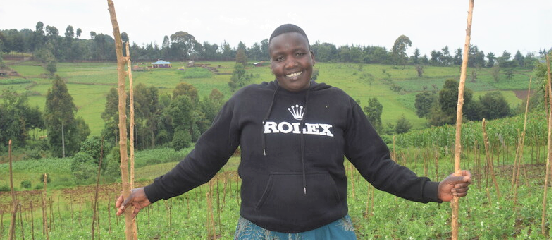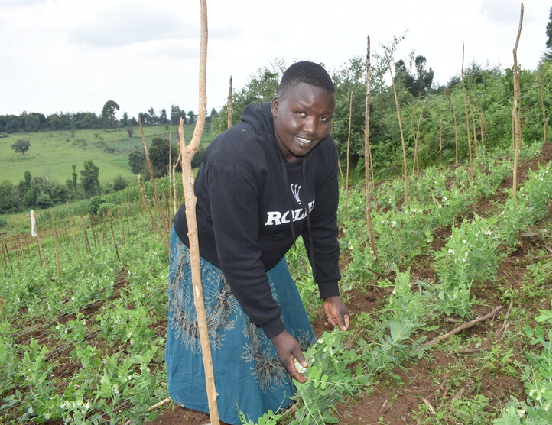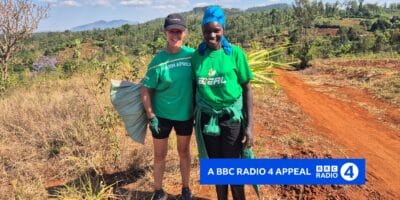News
20 August 2021
Horticulture project grows futures for young Kenyan farmers

UK aid from the UK government has enabled 2,000 young farmers in western Kenya to build sustainable livelihoods in the horticulture sector. A total of £410,000 in UK Aid Match funding enabled the charity Farm Africa to expand its successful Growing Futures project, which helps young people to set up profitable farming enterprises growing and selling vegetables that are in high demand.
The UK government matched funding was unlocked by the British public’s support for Farm Africa’s Growing Futures appeal, which ran from October 2017 to February 2018. The appeal was backed by the charity’s patron Sir Michael Palin, who presented a BBC Radio 4 appeal to raise funds for the Growing Futures project in October 2018.
As the three-year project comes to a close in 2021, average household incomes of project participants have more than doubled from 121,000 Kenyan shillings (KSh) (roughly £800) per year in 2018 to 308,547 KSh (£2,043) in 2021.
The significant improvement in the livelihoods of the smallholder vegetable farmers taking part in the project, which was based in Elgeyo Marakwet west sub-county, have been attributed to training in good agricultural practices that meet export and domestic market specifications, skills that help transform small farmlands into flourishing businesses and links to reliable markets.

The increases in average incomes followed record sales of vegetables to both the export and domestic markets, worth 62.3 million KSh. Vegetables sold included French beans, cabbages, garden peas and black nightshade (managu). The farmers’ total production soared from 381 metric tonnes at the start of the project to 3,731 metric tonnes at the end.
“The increase in production was catalysed by market links, which were established prior to planting. This gave farmers the assurance of an income upon harvesting. The short seasonality of the vegetables was also attractive to the smallholders, since they were able to receive earnings in a span of three months after planting,” said Stephen Muguna, project coordinator for Growing Futures.
For a community characterised by high levels of youth unemployment, limited market links for farm produce, low access to agricultural training and capital to invest in farming, this turnaround has given the young farmers a new lease of life, creating a dependable source of income.
“Through vegetable farming, I am able to make money within a very short period of time. I have been able to invest the money in other projects such as a motorbike which we use to offer transport services and this increases my family income. My daughter is joining high school; it is money from vegetable farming that I will use to pay her school fees. I can now afford to buy whatever food we want to eat in our home,” noted 35-year-old Gladys Jepkosgei, who farms snow peas and sugar peas.

The initiative established sustainable and reliable market links for the community by helping farmers secure contracts with two export companies and connecting them to 17 domestic buyers, such as schools and retail food stores.
Crop diversification, which included growing French beans, snow peas, garden peas, sugar snap peas, cabbage, kale, potatoes and other traditional vegetables, was encouraged to reduce the risk farmers faced from threats, such as erratic rainfall patterns, pests and disease.
With low access to extension (agricultural training) services across the county leading to low yields amongst small-scale farmers, the Growing Futures project trained 276 champion farmers to provide support for the rest of the group. This will be instrumental in ensuring that farmers are equipped with the relevant information needed to remain in profitable production.
Following the practical training sessions on agronomy and business, 50% of farmers adopted good agricultural practices such as soil nutrition intervention, pest and disease management, Maximum Residue Levels (MRL) management during chemical application and good post-harvest management techniques, which pushed the produce rejection level to 2.6%.
The project also helped farmers ensure their produce was compliant with export standards by securing Global GAP certification. By the end of the project, 45 groups had been certified and granted codes in the international market. To preserve the quality of produce and decrease post-harvest losses, three sheds were built offering areas where produce could be graded. The sheds had integrated storage areas kept cool by an innovative system of water running through charcoal.





